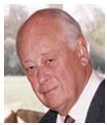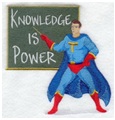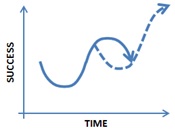|
 |
|
 |
Charles Handy, The Empty Raincoat
(1994) (called The Age of Paradox in America)
Irish oil executive who became a London Business School professor and renowned business philosopher (pictured right).
See also... Charles Handy in the Management Gurus section.
Book summary What is the empty raincoat? It comes from a sculpture (Without Words) by the American Judith Shea in Minneapolis, USA (pictured right) The empty raincoat shows that people have money but no soul.
How should you respond? 1. Repair your soul (with philosophy, love and reflection).
2. Improve the quality of your time a) focus more on the 4 F's - family, friends, festivals and fun. b) give less time to the 4P's - profit, performance, pay and productivity. 3. Fight fear and anxiety Cast off the burdens of your past through love.
4. Deal with paradoxes (or conflicting opposites) This is the Age of Paradox (see below).
Nine paradoxes 1. The Paradox of Intelligence Knowledge application is vital to wealth creation. But, unlike other resources, knowledge isn't owned by the organization but by the people who possess it (via education and lifelong learning). So business success depends on motivating these knowledgeable people. 2. The Paradox of Work Some people have work and money and not enough time. Others have no work, little money and lots of time.
3. The Paradox of Productivity If economic growth is low, higher productivity (production per head) means fewer jobs This forces people to:
4. The Paradox of Time We never have enough time despite time saving machinery and longer lives.
5. The Paradox of Riches Economic growth requires more spending, but we have fewer babies So extra demand must be found from luxury spending and exports. 6. The Paradox of Organizations Successful organizations are a mixture of opposites:
7. The Paradox of Age Every generation sees itself as different from its predecessor but insists that the next generation will be the same as theirs.
8. The Paradox of the Individual We value individualism and creativity but enforce conformity through organizations and teams.
9. The Paradox of Justice Justice under capitalism demands that the best receive the most, but this creates inequality.
How to deal with these paradoxes 1. The Sigmoid Curve An S-shaped curve illustrating the rise and ultimate decline of, for example, a product or organization. The product or organization must be rejuvenated by replacing the decline stage of the original curve with the growth section of a new one (from, for example, a new product or strategy) - pictured right. But this is difficult to achieve because success breeds complacency.
2. The Doughnut Principle For organizations:
For individuals a balance must be found between
3. The Chinese Contract A mutual, win-win agreement voluntarily enforced by trust, understanding and compromise. Compromise is particularly important for:
But don't compromise for the wrong reasons such as an easier life. “There are some principles worth dying for”, says Handy.
4. The federal organization This is a mixture of centralized and decentralized decision making based on:
a) twin citizenship Being a member of both the whole organization and a business unit.
b) subsidiarity Giving individuals, teams and business units the power to make decisions. Subsidiarity requires:
c) central activities serving the rest of the organization The centre must be responsible for;
5. The Corporate Contract This is based on making profits for shareholders by satisfying other stakeholders like customers, employees, suppliers and environmental groups.
Conclusion Your happiness is your responsibility, so save your soul.
Key quotes on success There has to be more to life than winning or we should nearly all be losers. There must be more to life than being a cog in someone else's great machine.
Key quotes on organizational objectives The principal purpose of a company is not to make a profit, full stop. It is to make a profit in order to continue to do things or make things, and to do so ever better and more abundantly. It is easy to lose ourselves in efficiency, to treat that efficiency as an end in itself and not a means to other ends.
Key quote on business ethics The market is a mechanism for sorting the efficient from the inefficient, it is not a substitute for responsibility.
Key quotes on ethics What we are can be as important an aspect of purpose as what we do. There are some principles worth dying for.
Key quote on business success It is better, then, to be tough than sorry.
|
|
|
||
|
|
|
||
|
||
| Copyright © wisdomtowin.com All Rights Reserved | ||
|















